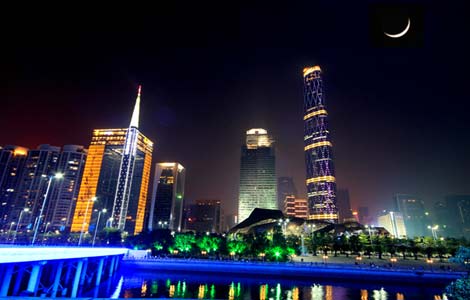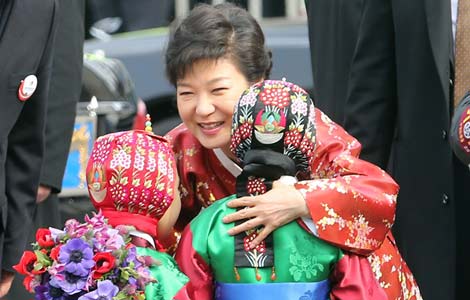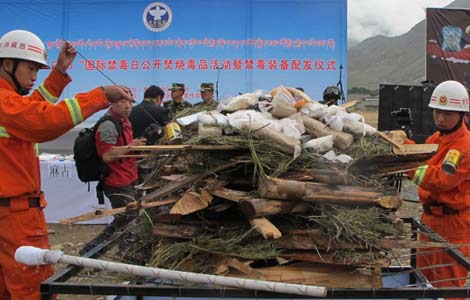27 killed as rioting hits Xinjiang
Updated: 2013-06-27 06:47
By Cui Jia in Shanshan, Xinjiang and Wang Xiaodong in Beijing (China Daily)
|
||||||||
Stabbings, arson in remote town as knife-wielding mobs go on rampage
Riots left 27 people dead in a remote town in the Xinjiang Uygur autonomous region early on Wednesday, local authorities said.
The riots happened at about 6 am in Lukqun township, Shanshan county in Turpan prefecture, about 250 km from the regional capital Urumqi.
Knife-wielding mobs attacked the township's police stations, the local government building and a construction site, stabbing people and setting fire to police cars, officials with Xinjiang's regional Party committee said.
Seventeen people - nine police officers and security guards and eight civilians - were killed before police opened fire and killed 10 rioters, the officials said.
Three rioters were seized at the scene and police were chasing those who fled, the officials said without clarifying how many were at large.
Three people were injured by the mobs and were being treated at a hospital.
The incident happened two months after a deadly attack by suspected terrorists in Bachu county, Kashgar prefecture, on April 23, in which 21 people, including 15 community workers and police officers, were killed.
"This is another typical terrorist attack in Xinjiang," Li Wei, director of the Institute of Security and Arms Control Studies at the China Institutes of Contemporary International Relations, said on Wednesday.
"Such terrorist attacks that happen in Xinjiang are closely related to separatist forces abroad."
Police investigations into similar cases have found that the attackers in Xinjiang usually receive training and instructions from separatist forces abroad, Li said.
Minister of Public Security Guo Shengkun, who arrived in Xinjiang on Wednesday afternoon to guide the investigation, said earlier that the ministry is working with the National People's Congress Standing Committee, the top legislature, on new legislation to deal with terrorism, organized crime and criminal activities masterminded through the Internet.
The potential laws, which China urgently needs in view of the current situation, will help safeguard national security and maintain social stability, he said.
Guo was delivering a report to the Standing Committee.
China does not have a specific law to deter terrorist activities, although the top legislature in 2011 approved a State Council document to allow the government to verify a list of terrorists and terrorist organizations, and freeze their assets.
In April 2012, the Ministry of Public Security released a list of six terrorists. Since then, the list has grown to at least 25 people. Their assets have been frozen.
Last week, nine people in Xinjiang stood trial at a court in Aksu prefecture for instigating ethnic hatred.
Ahetam Heli, one of the accused, was sentenced to six years' imprisonment after he was found to have used the Internet to promote religious extremism and to call for a "holy war" in November 2011.
Li Wei said police have been the primary target in terrorist attacks in Xinjiang.
He also said that Wednesday's rioting shows that attackers have turned to eastern Xinjiang, which has long been peaceful, after security was strengthened in southern Xinjiang, where several similar attacks occurred in recent years.
Xinhua and Zhao Yinan contributed to this story.
(China Daily USA 06/27/2013 page3)

 Philippine, US start Naval exercise in S China Sea
Philippine, US start Naval exercise in S China Sea
 Supreme Court gay rights ruling celebrated across US
Supreme Court gay rights ruling celebrated across US
 Rudd returns as Australian PM after Gillard
Rudd returns as Australian PM after Gillard
 Brazil protests intensify before Confed Cup semifinal
Brazil protests intensify before Confed Cup semifinal
 Long lost weekend
Long lost weekend
 Park ready to charm China
Park ready to charm China
 Prices climb as police crack down
Prices climb as police crack down
 China 'most promising' in FDI
China 'most promising' in FDI
Most Viewed
Editor's Picks

|

|

|

|

|

|
Today's Top News
Promising outlook on US, China investment
IBM to make Chinese job cuts
PBOC ends credit crunch, to go further
Snowden still at Moscow's airport, asylum pending
Mandela still critical, Zuma cancels trip
China slams Japan's new defense white paper
US Treasury Under Secretary to visit China
Door opens on better homes for poor
US Weekly

|

|







